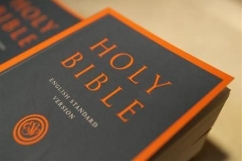
It's like an evangelical rally. The main speaker comes out on to the stage and begins a reading from the book, his voice full of emotion. And the 'congregation' respond – often with applause, raising of hands and a standing ovation. You would hear the 'Amens' and the 'Praise the Lords' if it were not for the fact that this particular group are atheists who have come to mock the Lord, not praise him. And their prophet does not let them down. The author of The God Delusion, Richard Dawkins, often began his tours of the US with a reading from chapter three of his book:
"The God of the Old Testament is arguably the most unpleasant character in all fiction: jealous and proud of it; a petty, unjust, unforgiving control-freak; a vindictive, bloodthirsty ethnic cleanser; a misogynistic, homophobic, racist, infanticidal, genocidal, filicidal, pestilential, megalomaniacal, sadomasochistic, capriciously malevolent bully."
Cue applause, cheering, laughter and sage nodding of heads. In passing, note how strange it is that those who don't believe in God waste so much emotion hating him!
However Dawkins is on to something. It is perhaps (along with suffering) the Achilles heel of the Christian faith. How can we believe in the God of the Old Testament? The God who apparently commands genocide and mass slaughter? It is for me the most difficult question of all to answer.
Not long after I became a Christian, many moons ago, I was given a book with the sub-title '101 problems from the Bible solved'. I was a new believer and still at the phase of the 'grass being greener, the sky being bluer' and everything being wonderful seen through the eyes of my newfound faith. I had no problems with the Bible. I loved it. It lived for me and it brought me Jesus. But after I read this particular book, I had 101 problems with the Bible – because while the problems were real, the answers given seemed to me largely superficial and shallow. It caused my first crisis of faith. The feeling was dreadful, but then the rationality and renewed mind that Christ had given me kicked in. Wait a minute, I thought, I am a baby Christian who cannot be expected to know everything and I cannot sit in judgement upon God. Of course there are things that will be hard for you to grasp and understand, just take a deep breath, take your time and trust in the goodness and mercy of God, and he will eventually answer your questions. He is good and wise and all knowing. You are not.
And so gradually over the years I have come to appreciate more and more the wisdom and goodness of God and have seen these problems being answered one by one. Of course there are still some that remain and even additional ones that I have come across – the devil, after all, constantly wants to accuse and cause doubts in the believer's mind about the goodness of God and the truthfulness of his Word. And I am still very limited in my understanding and knowledge and will be so until glory!
However this question of the OT genocidal God is one that I have really struggled with, until recently. And I have to thank Richard Dawkins for pushing me to wrestle with it even more. I knew when I read Dawkins that his description of God was a grotesque caricature, based upon ignorance and prejudice, but how could I answer the accusations for what is surely one of the ultimate defeater beliefs?
Firstly I realised that this could only be a problem for Bible-believing Christians. For the consistent atheist it cannot be a problem; it just becomes an accusation. It was actually Dawkins who put me on to this when he was seeking to defend the writer HG Wells, a liberal social Darwinist, who had suggested that for the sake of humanity the Africans and the Chinese would have to be wiped out. Dawkins simply pointed out that we could not judge people from other 'zeitgeist' with the values of our own. And thus with one fell swoop he destroyed all his criticism of the portrayal of God by people from a vastly different zeitgeist. At various times human cultures have decided it is OK to kill infants, enslave adults, mass murder Jews and abort the handicapped. For the atheist each culture determines its own meanings and morals. Only if there is an absolute God can there be an absolute moral law which applies across all nations throughout all ages.
For the consistent atheist there is ultimately nothing but chemicals, and chemicals don't have morals. People being killed is really just a rearrangement of chemistry within the amoral universe. Morals and concepts of good and evil are just human social constructs. There is no absolute morality and therefore no one is in a position to judge whether what anyone else does is right or wrong. In other words, the atheist has no philosophical or logical basis on which to judge the God of the Old Testament, and so they have to resort to Christian ideology to do so – ultimately a self-defeating position.
Which brings us on to the Christian position. There are of course those professing Christians for whom this is not a problem. They have their own personal 'Jesus' and they just know what their Jesus would or would not do. They don't accept the whole Bible as the Word of God and so they chuck out anything that they don't like, or that they think is not quite appropriate for today's culture. Anything you don't like in the Bible you can just remove and then claim Jesus/the Holy Spirit/scholarship told you to. No problem. No answer. But ultimately no Christ. As Augustine pointed out, if you believe in the Bible what you like, and leave out what you don't like, it's not the Bible you believe, but yourself.
So how can I as a Bible-believing Christian be comfortable or live with my faith in a God who apparently commanded genocide? We have to be very careful how we answer this. Beware of shallow and superficial answers that do not seem to recognise the depths of the problem or the answer. I remember a young deacon who heard someone speaking on the destruction of the Amalekites and eventually turned away from the faith. The sermon lacked passion, compassion, logic and Christ. Far too often our answers come over as if they were the result of a computer generated logic machine, rather than something that involves the nature and justice of God, and the fate of our fellow human beings. If we in Milton's words "seek to justify the ways of God to men", we had better be sure that our answers are biblical and from the heart. This is very emotional and right on the edge of human understanding and comprehension.
In my own struggles this is as far as I have reached. I apologise if this is not philosophical or evidenced enough for you, and if it does not provide all the answers you are looking for, but I hope it may help at least some.
Firstly I start with the Old Testament picture of God. I live with the psalms. They are my spiritual lifeblood and they express every emotion I have. Immediately when I read Dawkins I thought of Psalm 86:15, "But you, O Lord, are a God merciful and gracious, slow to anger and abounding in steadfast love and faithfulness," or Psalm 103:8, "The Lord is merciful and gracious, slow to anger and abounding in steadfast love."
You will note that there is a common misunderstanding which is now deeply ingrained in the biblical illiteracy of Western culture. The God of the Old Testament is an ogre; the Jesus of the New is Love. Apart from the fact that the God of the Old Testament is the God of the New Testament and that he is the same yesterday, today and forever, what this meme fails to see is that the portrayal of God in the OT is primarily as a God of mercy. Watch this wonderful sermon jam that Solas produced with the inimitable Dick Lucas:
"The New Testament message foretells the coming of the Lord in judgement, the Old Testament message foretells the coming of the Lord in salvation... so much for those ignorant people who say the Old Testament God is an ogre and a monster."
Then I set my boundaries. We all have boundaries in which we think. You cannot understand the small picture until we get the big picture. Here are the biblical boundaries in which I think about this particular question – the North, South, East and West of theology.
God is love. What that means will take an eternity of searching out, but I know this there is nothing that contradicts the love of God in the commandments of God. When I look at Christ, I see God. There is nothing unGodlike in Christ, and nothing unChristlike in God. The Father, Son and Spirit are One God.
God is just. He cannot do anything unjust or wrong. For us to accuse God of injustice is for us to set ourselves as more righteous than he is. We judge the Judge. A foolish and immoral thing to do.
God is holy. His eyes are too pure to even look upon evil. Therefore he by definition cannot command that which is evil. The holiness of God is a much neglected doctrine, because too often we have confused it with the holiness of man. He is good. We are not.
God is all-knowing. He knows past, present and future. He knows circumstances, hearts, thoughts and 'secret' actions.
When I combine all of these it makes me realise that I cannot sit in judgment upon his actions. When I see this it teaches me to trust the Creator for all I have not seen.
With that as my framework and context I then go on to ask what does the text actually say? I need to work out what is descriptive rather than prescriptive (for example, God did not command Jepthath to kill his daughter – Judges 11). Then when we come to the commands I need to work out what they mean. For example the word often translated 'destroy' means to 'irrevocably hand over'; it does not necessarily mean kill. Then I need to try and understand why it is being said. For example the Amalekites for hundreds of years consistently sought to wipe out Israel, they were warned to leave, they represented a culture in which infanticide and gross sin were present. Usually the judgement of God is pronounced long before and all people everywhere are commanded to repent. Explusion from the land was the primary judgement rather than death. However it should be noted that the judgement for sin, according to the New Testament, is death. We are all ultimately going to die.

And it should be added that none of the historical incidents recorded in the history of the Old Testament are precedence or authority for Christians to do such actions today. Indeed the very opposite. It is ONLY God who could command such actions. The fact that he did so, albeit rarely and sparingly, is a warning to us of a far greater judgement to come. It is appointed unto man, once to die, and after that to face judgement.
In summary I would argue that a society which kills millions of human beings in the womb every year and is happy about euthanising the elderly, sick and depressed, is not really in a position of moral superiority where it can sit in judgement upon a holy, just, loving and all-knowing God. Once we understand the horrors of sin as the ultimate rebellion against such a God, once we get both the text and the context, then, and only then, will we begin to understand why God permitted and, in a few cases, commanded something that appears so evil. The surgeon's knife may appear cruel but ultimately it brings greater mercy. The commands of God are always gracious, true and good. I see through the glass darkly. I am the pot. I don't accuse the potter. I rejoice in his goodness. And I thank him for his revelation of himself in Christ.
This weeks recommended book is one that has helped me enormously with this question: Paul Copan's Is God a Moral Monster? (See also his follow up – Did God command Genocide?)
David Robertson is the moderator of the Free Church of Scotland and director of Solas CPC, Dundee.















